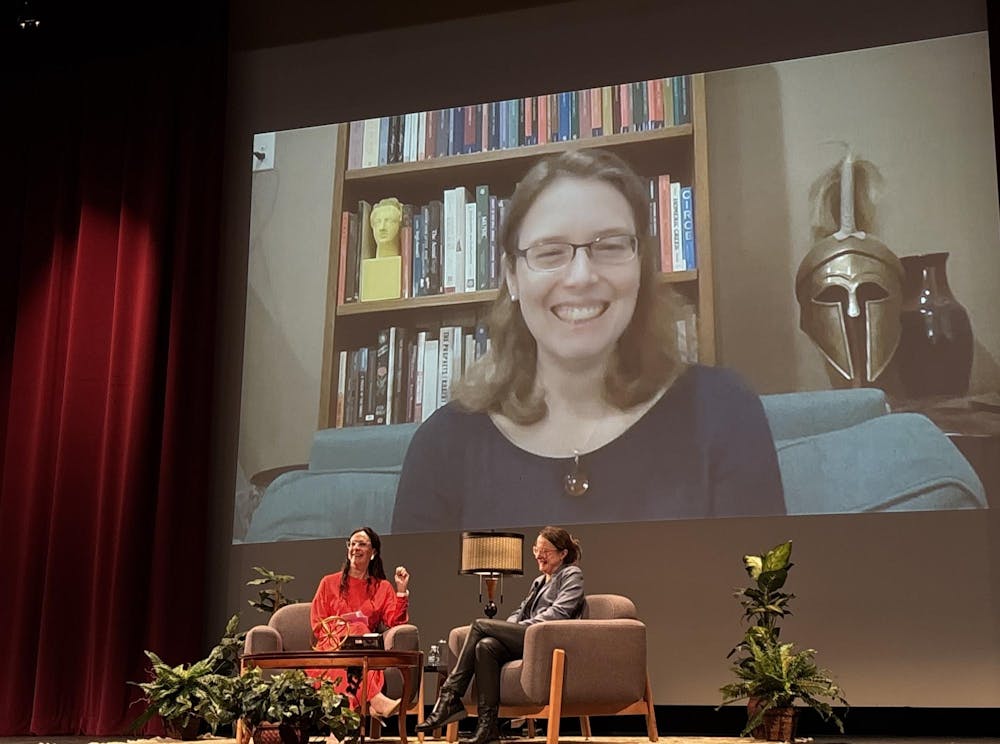On Tuesday evening in the packed O’Laughlin Auditorium, the humanistic studies department of Saint Mary’s College hosted best-selling author Madeline Miller and classicist Emily Wilson for the 2025 Francis A. McAnaney Humanities Lecture. Previously known as the Christian Culture Lecture until 2022, this was the first time in the lecture’s history to host a classicist and the first time two lecturers were invited.
Wilson, known as the first woman to translate Homer’s “The Odyssey” into English, is a professor of classical studies at the University of Pennsylvania. In addition to her translation of “The Odyssey,” she has also translated several ancient Greek plays and “The Iliad” during her career.
As a novelist, Miller is best known for her debut novel, “The Song of Achilles,” which earned the Orange Prize for Fiction and was a New York Times bestseller. Her second novel, “Circe,” was also an instant New York Times bestseller. Miller’s essays have also made appearances in publications such as The Wall Street Journal, The Guardian and NPR.
Jessalynn Bird, associate professor of humanistic studies, said she felt excited at the idea of inviting both Wilson and Miller, as she uses works from both authors in her classes.
“Personally, as someone who's always been interested in the classics and ancient medieval history, it was thrilling for me to be able to invite both to come to campus for different reasons. Partly, making things accessible by translation is so terribly important. But also reinterpreting ancient myths for a modern audience is [just as important],” Bird said.
Associate professor of humanistic studies Laura Williamson, as part of the committee who coordinates the lecture series, said the organizers emphasize having “a bit of variety” each year and mentioned Wilson and Miller as her “dream team for many years.”
“The purpose of the McAnaney Lecture is to highlight prominent figures in the humanities to not only the college campus, but also the community,” Williamson said, in a post on Saint Mary’s website. “[It] allows students to meet with nationally and internationally recognized authors, theologians, lawyers, and others who have experience in the humanities field.”
Prior to the main event, the humanistic studies and English departments hosted a seminar with Wilson for students within the departments and a dinner. Nominated high school students from nearby high schools in Indiana, Illinois and Michigan, a total of roughly 15 students this year also attended the seminar and main event through the lecture’s outreach program, according to Williamson.

“One of our ambitions with this lecture that we incorporate the community more, and, in particular, there's no better way than potential students in the area,” Williamson said. “They get to come and be part of this seminar opportunity, they get a tour on campus, a dining hall experience [and] their families are welcome to join. It's a nice way for them to get exposed to Saint Mary's.”
Wilson focused her presentation on variations of translating poetry, exploring how different translators choose to emphasize various terms and change the connotation of the poem. By using several excerpts from “The Odyssey,” she argued her translation “carries readers across unfathomable distances of space and time.”
“I hope that sometimes I'm using so much smooth, ostensibly effortless energy that the reader, like the sleeping Odysseus, can barely notice how much effort I put into [the translation],” Wilson said. “I hope that one thing that new translations of ancient texts can do is … make us unsure of our own place and time, and that can be a really useful thing to do as we think about how to defamiliarize ourselves from what we take for granted in our cultures.”
During her lecture, Wilson took time to break down translators' general priorities when interpreting a text, comparing translations from several sources and their noticeable differences based on the translator’s perspective.
“It seems to me really important in translating … to be thinking through the ways that they're interrogating their own values,” Wilson said. “There's a real flexibility of narrated point of view, which leads also to an ethical awareness that in every scene, there's the killers and the killed.”
Wilson also commented on the need for re-translations of texts.
“There can be things that are there in the ancient texts that can become hard to see when you get too used to a certain set of translations or a particular way of approaching them,” Wilson said.
Miller provided an independent perspective on the classics by centering her lecture on approaching classical literature from a novelist’s viewpoint. From a young age, she said her parents read her excerpts from “The Iliad” and “The Odyssey” epics, which formed her love of Greek mythology. She believed her passions for writing and ancient literature were separate, however, until she co-directed a play of Shakespeare’s “Troilus and Cressida.”
“As soon as I started working with the text and working with the actors who we had cast in these roles, I immediately just became electrified all over again with this idea that … [Shakespeare] was kind of throwing everything together and then doing whatever he wanted with it,” Miller said. “And it was amazing to see that happen, to see him just totally do exactly what he wanted with this text, and who cared what Homer actually said. It was very freeing and very exciting.”
She continued by breaking down her two novels, commenting on how she adapted the stories from Greek literature to integrate unique approaches to the humanity of her characters. Simultaneously “obsessed” and “frustrated” with the classics, Miller spoke about her ability to relate to and find comfort in these texts.
“There is something incredibly powerful, especially during moments of upheaval, during moments of pain, whether they're personal pain or national pain, and remember that this is not the first time that humans have lived through any of this,” Miller said.










